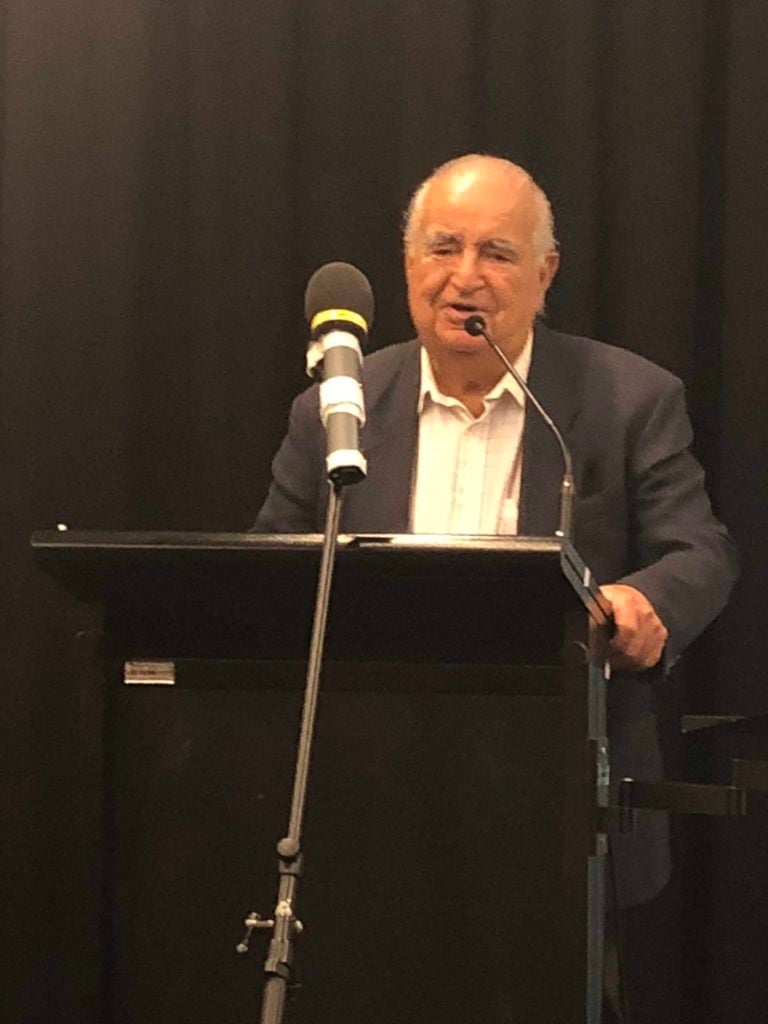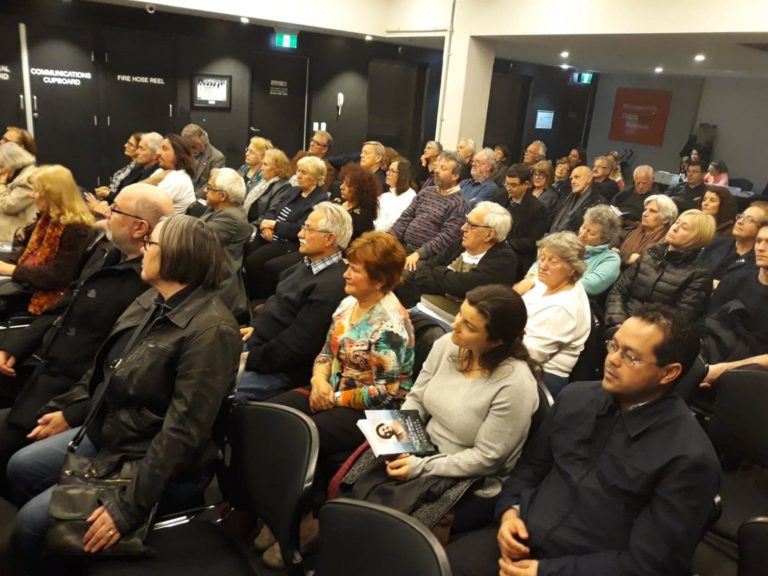Here is an unimaginable scenario: At the end of the horrific civil war in Greece in the 1940s, the Zangalis family in the village of Drymades, in North Epirus, is torn apart. Father in Athens, mother and one son exiled in Budapest, another son in Tashkent and soon after, two more siblings, migrants in Melbourne. One of the latter is George Zangalis, well-known unionist and activist for workers rights and social justice in Melbourne, where he arrived in 1950 as a 19-year-old. Fortunately for him, he had been able to complete his high school education back in Greece, which gave him an added advantage that most fellow-migrants lacked.
I distinctly remember the launch of his book Migrant Workers and Ethnic Communities – their struggles for social justice and cultural rights: the role of Greek-Australians – fittingly – at the Trades Hall Council in 2009.
Less than 10 years later, Zangalis re-appears in the world of books with a bilingual (Greek-English) memoir recounting how his torn-apart family evolves and heals. He wrote it in Greek, the language of his heart. Subsequently, the author handed the Greek manuscript over to Konstandina Dounis, a seasoned translator and scholar of Greek Australian literature, to render it into English.
Most readers will immediately realise that the title of George’s book alludes to another book written by Greek American journalist Nicholas Gage (Gatzoyiannis), titled Eleni. That book is also an ode to a mother, Gage’s own mother Eleni, but given from a perspective which is antithetical to view of the civil war. In Zangalis’ book the portrait of his own mother, Konstandia (or Konstando), is given as ‘the other Eleni’, from the perspective of the left and its persecution by the right which led to many thousands of Greeks ending up as exiles in the Soviet Union, Hungary and other countries.
Those who know the public face of Zangalis – an activist and defender of workers’ rights, a regular community broadcaster on 3ZZZ and a fully bilingual and integrated member of the wider Australian community – while deeply moved by his harrowing tale, will nevertheless understand the very reasons that made him the person he is today.
It is a fact that in recent years, the recounting of personal stories has gained due credibility and is considered an alternative source of history. As Melbourne University historian, Joy Damousi, has said, literature has the ability to reveal truths more vividly than official history books. History gives the cold facts, but a memoir deals with people’s personal lives.

George Zangalis has written his memoir, not because he thinks that his own life is important and worth telling, but because behind the personal story of his family, lies the Greek history of most of the 20th century: war, poverty, civil war, migration, settlement, integration, and multiculturalism.
Ode to Mother is a story then of great upheavals. As if sitting around with a good friend, the author recounts in a warm, confessional style the story of a family living in his village called Drymades, on the border between Albania and Epirus. This family is willing to put the country above all else during the German Occupation and the Civil War. The result for the Zangalis family is exile. They live apart for many years, not even knowing who is alive and who is dead.
What is not recounted in a history book is vividly delineated in George’s memoir. His mother Konstandia’s courage and her fight against fascism are greatly admired by her son, George. His separation from her in 1947 at the age of 16, never to see her again, constitutes “the greatest wound” in his heart, which will never heal. The first three pages of the book have to be the most harrowing, as they set the scene for the story recounted in the rest of the book. Here is how George, living in Melbourne, learns of his mother’s death in faraway Tashkent:
“I rush to the post office and get the letters. They are from Nikos [his brother]. I open the first and what do I see? A photo of Mother dead in her coffin. I thought my legs would give way beneath me… [in the Greek: Μου κόπηκαν τα πόδια…]
That photograph of my dead mother, the mother I so much wanted to see again alive, left a wound deep within me that time has never healed.”
This is a powerful and totally unforgettable description! It also demonstrates how much more the Greek has a way of touching our hearts – those of us who speak both languages. The power of the Greek in this book is felt from the very first sentence depicting what ironically turns out to be a final parting between mother and son: «Να σε φιλήσω μωρέ Γάκη, μάτια μου.» (Γάκη being the regional version of Γιώργο-Γιωργάκη-Γάκη).
How to render the expression ‘μάτια μου’ (which we use in Greek as a term of endearment – our eyes being the most precious aspect of our body) must have been one of the many problems which translator Konstandina Dounis had to deal with. Rendering the sentence literally: “Let me kiss you, Yaki, my eyes” would make no sense in English. “Let me kiss you now my son” is the next best option.
Equally, how does one convey feelings of panic, which the mother felt when her son George got home an hour after the curfew (in times of war, this can be fatal): In the Greek version George says: «Τη μάνα μου την έζωναν τα φίδια…» [literally: My mother was surrounded by snakes]. “My mother was beside herself” is the English translation. Greek is so rich in figurative language but sadly even we, native speakers of Greek, take it for granted. A bilingual book helps remind us of the intricacies of each language.
While part of this book recounts the experiences of the Zangalis family back in Greece: war, poverty, exile, death, another part recounts the long years George has spent in Melbourne and integrated into the wider Australian society through his diverse social and political activities. Equally importantly, however, he has espoused the ideals of multiculturalism which can be seen through his family life: George is married to Cavell – an Anglo-Australian woman who embraced things Greek with a passion – and their two children, Paul and Vasso also married to Anglo-Australians. Far from thinking that George has turned his back on things Greek, he has created an almost utopian life, instilling in his children, especially in his daughter Vasso, a love of the Greek language, the village, the tradition, the folk songs. They speak Greek and English, they keep the connections with the mother country by having rebuilt his mother’s house and visiting as often as they can. That is where the bones and ashes of several members of the family have been brought to and where Vasso had her baby ‘christened’ in the spring of Makriyianni in the village.

They also enjoy the physical beauty of Victoria and have another home in Wandiligong, near Bright, resembling his own village in Greece. It is clear that for the Zangalis family, this place is not just a ‘holiday house’. It is a branch of the same tree, which has deep roots in the ancestral village of Drymades.
A family memoir would not be complete without photographs throughout the book, as they form a pictorial narrative of their lives, making them more vivid and endearing for us, the readers.
Finally, George’s book has given us a demonstration of the importance of language and culture. His is a good example to emulate among younger generations for whom it is never too late to cultivate their own language skills and enrich their lives. For that to happen, good translators are needed to mediate between languages and generations. Our Greek community has many fully bilingual writers and translators, who perform this task not as an occupation, but a calling. Among them, Konstandina Dounis is a seasoned and passionate translator who has turned George’s book not only into a very readable English text, but a lesson for other aspiring translators.
‘Ode to Mother’ can be purchased from The New International Bookshop (nibs.org.au | 03-9662 3744) and from the Author.
*Helen Nickas is the author of ‘Athina and her Daughters: a memoir of two Worlds’ (Owl 2009).









